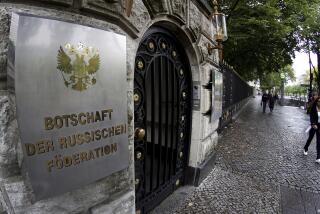Soviets Expel 6 More Britons : London Calls a Halt, Ends Ousters Linked to Spying
- Share via
MOSCOW — The Soviet Union today ordered six Britons out of the country in the fourth round of retaliatory expulsions sparked by the defection of the KGB chief in Britain. In London, the Foreign Office announced a truce in the spy war, saying it will not expel any more Soviets.
British Ambassador Bryan Cartledge was summoned to the Soviet Foreign Ministry and told of today’s expulsions, which included five British Embassy staff members and a Reuters news agency reporter. The announcement came two days after Britain added six Soviets to a list of 25 expelled last week on suspicion of being spies.
The Soviets retaliated for the first expulsion by ousting 25 Britons on Saturday. Today’s action means each side has expelled 31 of the other’s citizens.
No More Deportations
The Foreign Office in London said it would not deport any more Soviets.
“We wish to draw a line under this affair,” Foreign Office press spokesman Christopher Meyer said. “We have no plans at present for further expulsions from London.”
Meyer told a news conference that Britain has “the firm intention” of restoring its British Embassy staff in Moscow but did not say when.
He denied that the British decision amounted to a climbdown in the face of Kremlin defiance, calling this “a curious distortion of events.”
Prime Minister Margaret Thatcher insisted that the Soviets had lost out in the crisis that threatened to damage Anglo-Soviet relations.
‘Pretty Poor Light’
Speaking to reporters in Egypt, where she is on an official visit, she said: “This shows the Soviet Union in a pretty poor light. They were caught red-handed and are now red-faced.”
Cartledge branded today’s expulsions “a vengeful and spiteful act,” and said it would make it harder to rebuild relations with the Soviet Union.
“The Soviet government’s action today is far from constructive. It represents a further setback,” Cartledge said in a statement issued after he returned from the Foreign Ministry.
The British ambassador identified the six ordered out of Moscow today as Ian Sloane, embassy first secretary and cultural attache; Ian Wall, a communications staffer; Robert Hooper, assistant air attache; Sgt. Nigel Andrews, air attache staff; Paul Hughes of the naval attache staff, and Martin Nesirky, a correspondent for Reuters.
They have three weeks to leave the Soviet Union.
Nesirky is the second Reuters correspondent ordered out of Moscow, and the sixth journalist among the 31 Britons ordered to leave.
Cartledge said he was told by Foreign Ministry official Vladimir P. Suslov that the six were expelled for engaging in activities “incompatible with their status,” the usual diplomatic euphemism for spying.
The ambassador said the accusations “were groundless and unjustified.”
‘Innocent Victims’
He said the six Britons expelled today, like the 25 ordered out on Saturday, were “innocent victims of retaliation.” But he reiterated the British government’s statements that the 31 Soviets ordered expelled from London are spies.
The Soviet retaliations were considered extremely tough. Not only did they match the British number for number, but they included key embassy personnel involved in Kremlin political analyses and coded diplomatic communications.
The Soviets retaliated twice despite British warnings that if “even one” Briton was ordered out of Moscow, there would be more expulsions of Soviets.
More to Read
Sign up for Essential California
The most important California stories and recommendations in your inbox every morning.
You may occasionally receive promotional content from the Los Angeles Times.










